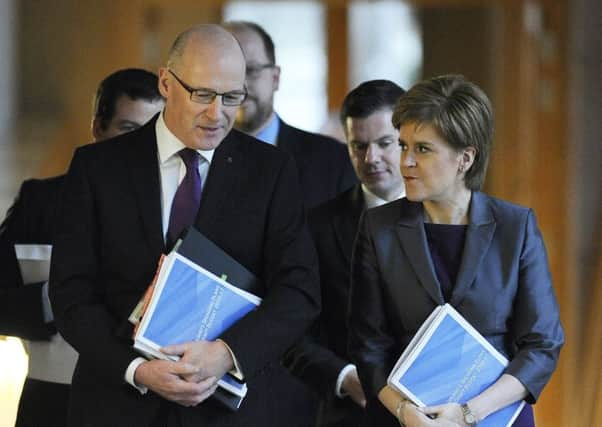Tom Peterkin: Need for impartial scrutiny never been greater


It is a little known fact that the UK Finance Bill runs to some 2,002 pages, just six pages short of Leo Tolstoy’s feat of literary endurance War and Peace.
There cannot be many people on this earth who have managed to plough their way through both. Come to think of it, in this dumbed-down era, there can’t be many people who have succeeded in completing either of these two differing intellectual challenges.
Advertisement
Hide AdAdvertisement
Hide AdBy contrast, the Scottish Spending Plans and draft Budget for 2016-17 comes in at a meagre 182 pages. It would be tempting to think of the Scottish Government’s keynote financial document as more of a Mills & Boon than a Russian masterpiece.
But that sort of characterisation would be misguided, especially now that Scotland has a whole raft of new taxation powers. Scottish Government pronouncements on taxation can no longer be dismissed as flimsy romances.
Understanding the contents and, more importantly, the impact of Scottish Government financial documents has become more important now that a whole host of new powers – including the ability to alter income tax rates and bands – are coming to Edinburgh.
When it is considered that some economic levers remain reserved to Westminster, it follows that a substantial portion of the economic policies contained in the voluminous UK Finance Bill will apply to Scotland.
Therefore – as Scotland follows its own devolved path economically – there is a greater need than ever before for impartial and intelligent scrutiny of the complex financial arrangements which will affect everyone living north of the Border.
One of the problems at the moment is that the Scottish Parliament seems incapable of playing that sort of role.
Discussion of Holyrood’s short-comings has become a recurring theme, as observers of the political scene rehearse arguments about the parliament not being designed to hold a majority government to account.
The spectacular rise of the SNP means the committee system is no longer fit for purpose as most of them now have a in-built Nationalist majority. Yesterday’s Labour manifesto contained suggestions about how to weaken a dominant party’s grip on the parliament. One proposal was that a majority party should not hold the majority of committee convenerships.
Advertisement
Hide AdAdvertisement
Hide AdSimilar proposals are made in the Tory manifesto. The outgoing Presiding Officer, Tricia Marwick, has been at it as well – going as far as advocating a second chamber to enable better examination of legislation. Murmurings have even come from John Swinney, the finance secretary. At a recent hustings event hosted by the Institute of Chartered Accountants Scotland (ICAS), the Deputy First Minister noted that today’s parliamentary arrangements were still based on the model proposed by an all-party consultative steering group, which sat back in 1997 and 1998 in preparation for the coming of devolution in 1999. Seventeen years after the establishment of the Scottish Parliament, Mr Swinney suggested it was “not unreasonable” to “take stock” and revisit how laws are scrutinised.
At the same hustings, however, Mr Swinney was challenged by the Conservative Murdo Fraser about the SNP’s apparent reluctance to expose the Scottish Government to independent thought. Mr Fraser recalled that earlier this year SNP MSPs on the finance committee became embroiled in controversy over the creation of the new Scottish Fiscal Commission, the body set up to scrutinise taxation.
To begin with the MSPs agreed the independent commission should be responsible for producing tax forecasts upon which ministers would base their budgets. They even signed off a report to that effect. They then reversed their position and voted down their original recommendation as it became clear Mr Swinney would prefer ministers rather than an independent watchdog to make the forecasts.
There were suggestions that SNP MSPs had performed the U-turn in order to strengthen Mr Swinney’s hand during the negotiations with the UK government on the fiscal framework, the financial mechanism that will underpin Scotland’s new powers.
As the deal with the UK government was sealed there was another about-turn and Mr Swinney finally accepted that the commission – not ministers – should make the forecasts.
This episode, Mr Fraser said, was “illustrative of the wider problem” of MSPs taking their orders from “ministerial powers”.
In such circumstances, there must be a case for experts to step in and take the sort of role played by the Institute for Fiscal Studies south of the Border. It is the IFS which picks apart the Chancellor’s Budget in forensic detail the day after it is delivered. Of course there are individuals and organisations in Scotland who are willing to use their expertise in this manner. The economist John McLaren of Glasgow University is a notable example. The Institute for Public Policy Research is another. Moreover, bodies like ICAS – and others – have an unrivalled background in taxation as well as a strong track record in engaging with parliament. Is now not the time for Holyrood to work more with such organisations to ensure the people of Scotland get the legislation they deserve?